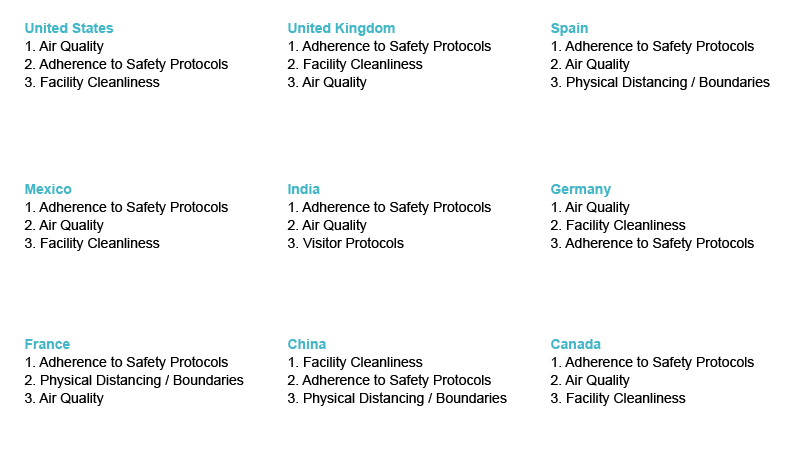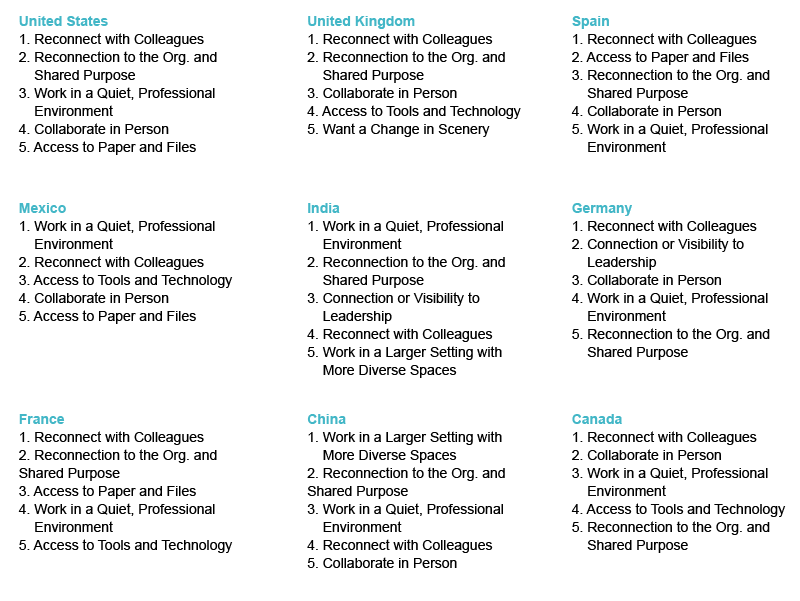We use cookies to make this site as useful as possible and maximize your experience. By closing this message, you consent to our cookies on this device in accordance with our cookie policy unless you have disabled them in your browser settings.
The Office of the Future: Changing Workplace Expectations Pt. 2

Over the past year, employees all over the world have spent more than enough time at home. This has inevitably given them a chance to come up with some new expectations for their employers upon returning to their—or creating an entirely new—workplace.
We looked at a series of office case studies that identified five critical needs that will likely change and improve the average employee’s overall work experience. Some of the five were already concerning before the pandemic began, but ample time spent at home has caused an increase in the collective awareness surrounding the importance of each. What will the office of the future look like when it comes to honoring new expectations?
Safety in the Office of the Future
For people to feel comfortable returning to the office, they need to feel safe and be safe. Right now, that can easily come in the form of choices. Most people want the freedom to choose how they go about protecting their health and safety. A new set of safety issues reveals how people all over the world view their top concerns about returning to their workplace. Mitigating the spread of the disease is amongst the most important.

Air quality, the adherence to safety protocols, and general cleanliness also rank high on the study. It’s clear people will need to feel confident that their office spaces are safe and to trust that their employers and peers are doing everything possible to keep it this way.
Belonging in the Office of the Future
People have a basic need to belong. We’re fundamentally hardwired this way. A lot of us were already searching for this in the pre-pandemic days. At the same time, the coronavirus has left people feeling extremely isolated, and the need to feel part of a community in the workplace has never been more important. Most employees rank connection to people and purpose among the top reasons for wanting to return to the workplace.
Community not only contributes to people’s wellbeing, it leads to better business outcomes as well. When people perform their job functions as a part of a community, this leads to higher scores in areas like productivity, engagement, innovation and commitment. Creating community while people are not physically together is tough and requires significant effort. The more people work from home, the greater the challenge. The future of office space can be designed to help foster a sense of community. We discovered three specific attributes that make a positive impact across all countries studied:
- The workplace has places where leaders are present and accessible.
- There are spaces that foster social interaction and help build a sense of belonging.
- The workplace offers stimulating and inspiring areas that promote ideation and creative problem-solving.

Productivity in the Office of the Future
People want to feel that what they do is meaningful. This is even more important during the COVID-19 crisis, as employers have had to respond to dramatically changing workplace conditions.
Before the pandemic, people struggled in offices if they didn’t have the right levels of privacy to allow them to focus. Now, it’s predicted that people will come back to the office solely for group activities and collaboration. But the data shows employees and leaders want to design new office environments to support both individual focus work as well as collaboration.
Employees, in particular, want office spaces to provide areas for focus because their home environments are less likely to offer the same workplace amenities, i.e. desks, office chairs, computer monitors, etc.
Comfort in the Office of the Future
People are more deeply aware of their physical, cognitive and emotional needs for comfort and wellbeing. They now expect employers to address them when they return to the office. Those who have been comfortable at home would like that to continue when they return to work. Those who’ve been uncomfortable working from home are looking forward to new office designs that support their comfort.
Emotionally, one of the most important things people want employers to provide when they return to the workplace is an increased sense of belonging to their team, a connection to the company culture, and the ability to socialize. This could possibly be a reflection of the rigorous restrictions around social gatherings throughout the pandemic.
Control in the Office of the Future
While being at home all day has its disadvantages, many people feel they have more control over their day at home than they do in the office. They are free to choose if they work from a dedicated office space or while they sit on the sofa. They also have more freedom to integrate aspects of their personal lives throughout their day, such as exercising or interacting with family, friends, or pets.
With the pandemic still in mind, people want to control their proximity to other people as well. The ability to move desks, technology, or boundaries can help give people the visual and territorial privacy they need to focus. In addition to no commute, another highly rated work-from-home perk is increased flexibility. People also feel their work-life balance significantly improves. Moving forward, people will want to maintain this same level of control over their work lives. And organizations are taking the necessary steps to cater to these increased desires.
In every country people ranked autonomy and work-life balance as things that improved while working from home. The percentages below indicate the number of people who said these factors moderately or significantly improved.
Stay tuned for Part 3 of our Work Better blog series. For more information on returning to the workplace, download our Post-COVID Playbook for tips on what an office of the future might involve. Still have questions? Contact us today at (858) 569-4700 or complete this contact form. We’re happy to help.
For teams returning to the office, bkm OfficeWorks offers white-glove moving and relocation services to assist with every aspect of this major shift.
